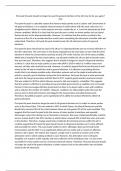Essay
'First past the post should no longer be used in UK general elections'
- Institution
- AQA
This document is a grade A level response to the paper 1 politics paper. It answers the question of 'first past the post should no longer be used in UK general elections' and includes the structure required for exams along with suitable examples to support the arguments on both side. This would be ...
[Show more]




